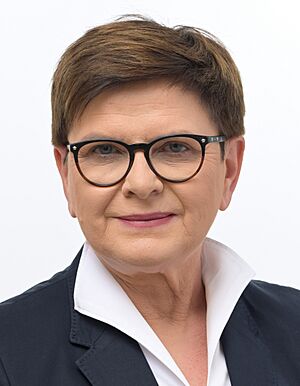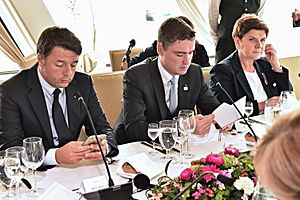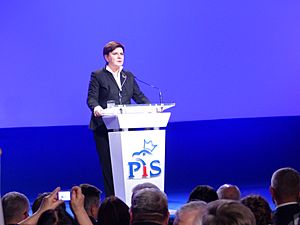Beata Szydło facts for kids
Quick facts for kids
Beata Szydło
|
|
|---|---|

Official portrait, 2024
|
|
| Prime Minister of Poland | |
| In office 16 November 2015 – 11 December 2017 |
|
| President | Andrzej Duda |
| Deputy | Mateusz Morawiecki Piotr Gliński Jarosław Gowin |
| Preceded by | Ewa Kopacz |
| Succeeded by | Mateusz Morawiecki |
| Deputy Prime Minister of Poland | |
| In office 11 December 2017 – 4 June 2019 Serving with Piotr Gliński, Jarosław Gowin
|
|
| Prime Minister | Mateusz Morawiecki |
| Preceded by | Mateusz Morawiecki |
| Succeeded by | Jacek Sasin |
| Member of the European Parliament | |
| Assumed office 2 July 2019 |
|
| Preceded by | Edward Czesak |
| Constituency | Lesser Poland and Świętokrzyskie |
| Chairman of the Social Committee of the Council of Ministers | |
| In office 11 December 2017 – 4 June 2019 |
|
| Prime Minister | Mateusz Morawiecki |
| Deputy | Rafał Bochenek |
| Preceded by | Office established |
| Succeeded by | Piotr Gliński |
| Member of the Sejm | |
| In office 25 September 2005 – 4 June 2019 |
|
| Preceded by | Janusz Kozik |
| Succeeded by | Krzysztof Kozik |
| Constituency | 12 – Chrzanów |
| Personal details | |
| Born |
Beata Maria Kusińska
15 April 1963 Oświęcim, Poland |
| Political party | Law and Justice |
| Spouse | Edward Szydło |
| Children | 2 |
| Education | Jagiellonian University |
| Signature |  |
Beata Maria Szydło (born 15 April 1963) is a Polish politician. She has been a Member of the European Parliament (MEP) since 2019. She is a member of the Law and Justice party, often called PiS.
Before becoming an MEP, she served as the prime minister of Poland from 2015 to 2017. Beata Szydło was the third woman to hold this important position in Poland. She is currently a vice-chair of the European Conservatives and Reformists (ECR) group in the European Parliament.
In 2015, she successfully led the campaign for Andrzej Duda to become President of Poland. Later that year, her party, Law and Justice, chose her to be their candidate for prime minister. On 25 October 2015, Law and Justice won the election, gaining a majority in the government for the first time. Beata Szydło was then appointed Prime Minister on 16 November by President Duda.
During her time as prime minister, she often spoke out against some European Union policies, especially those about immigration. She also strongly defended her government when other EU leaders criticized it. In December 2017, she stepped down as prime minister. Her resignation was accepted by President Duda, who then appointed Mateusz Morawiecki as the new prime minister. Morawiecki later appointed Szydło as his Deputy Prime Minister.
In 2019, Szydło ran for the European Parliament elections. She was elected to represent the Lesser Poland and Świętokrzyskie area. She received the most votes of any candidate in Poland's history for that election. After winning, she resigned from her role as deputy prime minister.
Contents
Early Life and Education
Beata Szydło was born in Oświęcim, Poland. She grew up near Brzeszcze, where her father worked as a miner. She studied at Jagiellonian University in Kraków and graduated in 1989. She also completed special post-graduate studies for managers in culture in 1997 and for local government management in the European Union in 2001.
Starting Her Political Journey
Szydło became the Mayor of Gmina Brzeszcze when she was 35 years old. She held this job for seven years. During her campaign, she helped local people fix a school that had lost its roof in a storm.
In September 2005, she was elected to the Sejm, which is the lower house of the Polish Parliament. She was a candidate for the conservative Law and Justice party. She was elected to the Parliament four times. On 24 July 2010, Szydło became the vice-chairman of the Law and Justice Party.
After successfully leading Andrzej Duda's presidential campaign, Beata Szydło was chosen as the Law and Justice party's candidate for prime minister in June 2015. Many people saw her as being more moderate than the party's leader, Jarosław Kaczyński.
In the October 2015 election, Law and Justice won a big victory. They became the first Polish party to win a clear majority since the end of Communism. Szydło was sworn in as prime minister on 16 November 2015.
Prime Minister of Poland (2015–2017)

On 18 October 2015, she gave her main speech as prime minister. Her government received 236 votes in favor. One of her first decisions was to remove the European Union flag from press conferences at the Prime Minister's office. She also replaced a clock in the meeting hall with a Cross.
When meeting with voters, she promised to lower the retirement age and increase the minimum wage. She also said that introducing the 500+ program would be a top priority. This program started on 1 April 2016. It gives families 500 Polish złoty (PLN) for every child, starting from the second child. This program was meant to encourage population growth.
During her time in office, there was a disagreement about the Polish Constitutional Court. The European Parliament expressed serious concerns about this situation in April 2016.

Szydło's government was against the UK's efforts to limit benefits for EU immigrants. She also offered support for Brexit if NATO troops could have a permanent base in Poland.
She resigned from her position as prime minister on 7 December 2017. The next day, President Andrzej Duda accepted her resignation. He then named Mateusz Morawiecki, who was the Finance Minister and Deputy Prime Minister, as the new prime minister.
After Being Prime Minister
Beata Szydło was appointed Deputy Prime Minister of Poland by Mateusz Morawiecki, just a few days after she stepped down as prime minister.
In 2019, Szydło ran for the European Parliament elections. She was elected to represent the Lesser Poland and Świętokrzyskie area. She received the highest number of votes of any European Parliamentary candidate in Poland's history. She resigned as deputy prime minister on 4 June 2019 to take her seat in the European Parliament.
In April 2024, she spoke out against the European Green Deal. She said that people were struggling with bills and saw no future because of it. She believes that this "green ideology" does not help Europe's future.
Personal Life
Beata Szydło is married to Edward Szydło. They have two sons: Tymoteusz (born 1992), who was a Catholic priest, and Błażej (born 1994). She is a very religious Catholic and believes in conservative Christian values.
Safety Incidents
On 21 November 2016, Szydło's car was in a crash in Israel. It involved five vehicles, including a police car and an ambulance. She was in Israel for talks with Prime Minister Benjamin Netanyahu.
A few months later, on 10 February 2017, Szydło and two security officials were hurt in a car crash in her hometown, Oświęcim. Her car swerved and hit a tree to avoid a small Fiat. The driver of the Fiat was later charged with causing the accident. She had bruises and was taken to a hospital in Warsaw.
State Visits Gallery
-
Visegrád Group Leaders: Robert Fico, Szydło, Bohuslav Sobotka, Viktor Orbán (2015)
-
Polish Prime Minister Szydło with Pope Francis (2016)
-
Polish Prime Minister Szydło with Viktor Orbán (2016)
-
Polish Prime Minister Szydło with Juan Carlos Varela (2016)
-
Polish Prime Minister Szydło with Donald Tusk, Robert Fico, Jean-Claude Juncker (2016)
-
Polish Prime Minister Szydło with Edi Rama (2016)
-
Polish Prime Minister Szydło with Angela Merkel (2017)
-
Polish Prime Minister Szydło with Jüri Ratas (2017)
-
Polish Prime Minister Szydło with Xavier Bettel (2017)
-
Polish Prime Minister Szydło with Emmanuel Macron (2017)
See also
 In Spanish: Beata Szydło para niños
In Spanish: Beata Szydło para niños
- Cabinet of Beata Szydło
- History of Poland (1989–present)
- List of political parties in Poland
- List of politicians in Poland
- Politics of Poland
- 2015 Polish parliamentary election
- 2015 Polish presidential election
 | Laphonza Butler |
 | Daisy Bates |
 | Elizabeth Piper Ensley |












